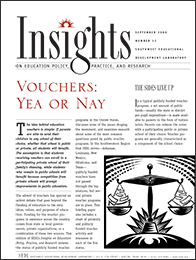Should Voucher Programs Be Accountable for Achieving State Standards?
Private schools have traditionally operated outside the scope of public authority. They do not report their achievement results or how they use their funds. As more public dollars flow into private schools, one question that will increasingly surface is, "How are these funds being used?"
A Gallup poll in 1998 showed that of the 44 percent of the respondents who were in favor of private school choice, 75 percent agreed that "private or church-related schools that accept government tuition payments should be accountable to the state in the way public schools are accountable." Advocates of more stringent reporting requirements argue that a lack of clear accountability interferes with the public’s ability to evaluate whether or not continuing vouchers is good public policy.
Different Schools Aim for Different Goals
The question of whether private schools ought to be accountable to the public for their use of public funds continues to challenge policymakers. A 1998 U.S. Department of Education report, conducted at the request of Congress, stated that private and religious schools were unlikely to participate in a voucher program that would require them to meet the same accountability standards required of public schools. Those key areas included admissions, student testing, curriculum, and religious training (Muraskin, Fried, & Lahring, 1998). Private schools maintain that the marketplace is a sufficient measure of their performance. Those private schools that hew to the higher standards that parents are looking for will draw growing numbers of students; those that don’t live up to expectations will simply go out of business.
A 1998 U.S. Department of Education report stated that private and religious schools were unlikely to participate in a voucher program that would require them to meet the same accountability standards required of public schools.
Accountability questions revolve around such matters as what outcomes to look for in voucher programs, how to measure them, and how to handle schools that fail to live up to their promises. These issues can be technically or logistically difficult for public schools. For private schools, the major question becomes, "How fair is it to measure and compare student achievement when the goals of education may differ from school to school?" For example, while educational standards and achievement are always important, some parents send their children to private schools for other reasons, such as school safety, a particular pedagogical orientation or special program, or religious training and philosophical reinforcement. Accountability demands, then, could change the very nature of private schools, interfering with the missions and curricula that have made them a unique and valuable part of education in the United States.
States’ Oversight Varies
So far, voucher programs have addressed these dilemmas in different ways. In Florida, participating private schools are not graded as are public schools under the state’s accountability system, but students using vouchers do have to take state tests.
Legislation expanding Milwaukee’s vouchers to include religious schools specifically eliminated the requirement that the state superintendent of schools conduct annual performance evaluations of private schools that received voucher students. The only requirement is an evaluation of the voucher program to be submitted to the legislature. Nor do private school teachers have to be certified, curricula reviewed, or private schools accredited by any outside agency.
Milwaukee private schools accepting vouchers, however, must meet other requirements. They cannot discriminate against disabled students, for instance. Also, they must provide at least 875 hours of instruction each year in reading, language arts, mathematics, social studies, science, and health, and meet all the health and safety laws or codes that apply to Wisconsin public schools. The Wisconsin legislature also specified in 1998 that schools receiving vouchers submit an independent financial audit annually and, in the case of religious schools, allow parents to exclude their children from religious activities.
In addition, to continue participating in a voucher program, a private school in Milwaukee must meet one of four requirements (Wisconsin Education Association Council, n.d.)
- At least 70 percent of voucher students must advance one grade level.
- Voucher students at the school must, on average, have at least a 90 percent or better attendance rate.
- A school must certify that at least 80 percent of its voucher students demonstrate "significant academic progress"—although the state does not define how that progress should be measured.
- At least 70 percent of families of voucher students must meet the school’s own criteria for parental involvement.
Next Page: Vouchers Add Costs

